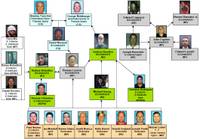Just as the Internet gambling industry was building credibility in Nevada with strict regulations, taxation and reputable participants, along came Michael Lloyd Colbert.
Colbert, 32, the local Cantor Gaming sports book director and a Nevada gaming licensee, was among 25 people indicted this week in what New York prosecutors call a national illegal sports-betting ring that ran wagers through offshore Internet gambling sites.
The indictment is clearly bad news for Colbert and his co-defendants. But its effects on Cantor Gaming as a company, the sports book business as a whole and the emerging online gambling industry remain to be seen.
It could cause headaches for local people and companies entering the state’s new regulated online poker industry. That emerging sector has a dozen licensees so far with more in the approval pipeline, including giants Caesars Entertainment, MGM Resorts International and Wynn Resorts.
Any association with illegal Internet gambling by a Nevada licensee presents, at minimum, a public relations problem for online poker.
That’s partly because of online poker’s own troubled past, with cases such as the shutdown of illegal online poker operators on Black Friday in April 2011.
"Anything that doesn’t smell right is a negative for that effort," said Anthony Curtis, publisher of the Las Vegas Advisor, a gaming newsletter and website for consumers.
But David Schwartz, director of the Center for Gaming Research at UNLV, said it’s unlikely legal online poker will be tarnished by the sports-betting scandal. That’s because the Internet is merely a tool for communication, he said, and no one would make a connection between legal online poker and illegal sports-betting if the sports bettors were using pencils and paper to execute bets.
Attorney Anthony Cabot, who chairs the gaming law group at the Las Vegas law firm Lewis and Roca, said the indictments illustrate the lack of regulation of most sports betting in the United States. Experts estimate that illegal sports betting could involve $250 billion annually. One of the purposes of legalizing online poker was to regulate and tax the common activity.
"It points to the need for greater transparency" in unregulated sports betting transactions, Cabot said.
As for Cantor Gaming, the company’s sports-betting customers likely were unaffected by Colbert’s alleged criminal activity, Curtis said. One of the key features of legalized sports wagering is that odds on games are posted publicly so gamblers can decide whether to bet and which bets to take.
That means that no matter what Colbert was up to, the lines his books posted were available for anyone to scrutinize, and those who didn’t like them could find odds they liked elsewhere, Curtis said.
Cantor Gaming now faces a public relations quandary with its seven partner casinos in Las Vegas and the potential new partners it hopes to gain as it grows locally. Still, the company should be able to continue operating successfully, as long as higher-ups weren’t involved, Curtis said.
"Right now it looks like it didn’t involve the company and he was putting out a shingle to work on his own," Curtis said.
It’s illegal for Americans to place wagers with offshore sports books but the practice continues — even in Las Vegas, where legal sports books are easy to find. It is particularly rampant among professionals or frequent bettors who want convenience and more favorable betting lines, discounts or rebates, Curtis said.
Cantor undoubtedly will face questions from regulators, even as it moves to distance itself from Colbert.
"Our investigation into this is ongoing and will involve any business holding a gaming license in the state — and that would include Cantor Gaming," Jerry Markling, chief of enforcement for the State Gaming Control Board, said Thursday.
Cantor officials said the arrests had no effect on the company's race and sports books.
"This case relates to Mike Colbert as an individual," Cantor spokeswoman Hannah Sloane said. "This case does not involve Cantor Gaming."
Cantor Gaming has aspirations to enter the Internet poker industry like many of its competitors. One of the questions the company will face is how its own internal compliance department failed to keep tabs on Colbert.
When it was considering selling stock to the public last year, a Cantor affiliate noted how important compliance with gaming laws is.
"We will be subject to disciplinary action by the Nevada Gaming Control Board or Nevada Gaming Commission if we engage in any activity or enter into any association that is unsuitable for us because it poses an unreasonable threat to the control of gaming in Nevada, reflects or tends to reflect discredit or disrepute upon Nevada or gaming in Nevada, or is contrary to Nevada gaming policies," the company said in a regulatory filing.
Colbert acted as one of the criminal enterprise's "money collector/agents'' who built a clientele of bettors for the ring, prosecutors said.
"It is alleged that the agents were the intermediaries between the bettor and the enterprise itself and were responsible for 'squaring up' or 'settling up' with the bettors — usually on a designated day each week — by collecting and paying out money owed," New York prosecutors said.
The ring allegedly collected $50 million in profits over an 18-month period.

